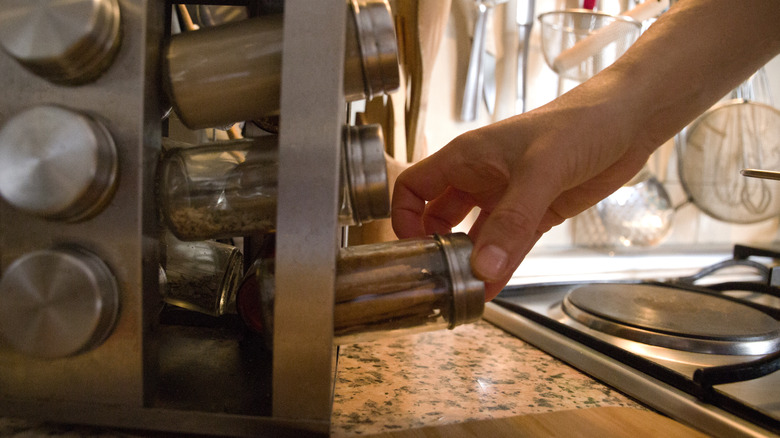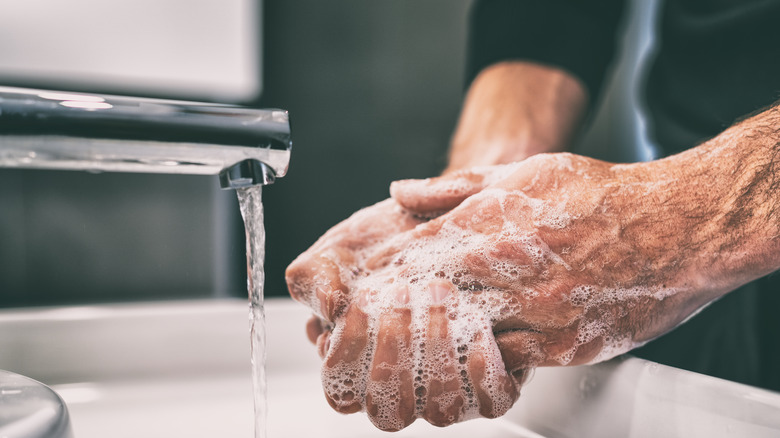The Germiest Place In Your Kitchen Isn't What You'd Expect. Here's How To Keep It Clean
Spice jars may be small, but they pack a punch in the kitchen. However, they can also be a breeding ground for germs and bacteria, so keeping them clean is essential. According to a recent study published by the International Association for Food Protection, the average spice jar can contain more bacteria than cuttings boards, sinks, or refrigerator handles. This is because spices and herbs are often handled with unwashed hands, and the moisture and warmth of the kitchen can provide a conducive environment for bacteria to flourish.
Dirty spice jars can lead to food contamination, as bacteria can transfer from the jar to the food. This can cause foodborne illnesses, such as salmonella or E. coli, which can be especially dangerous for young children, the elderly, and those with weakened immune systems. In addition, unclean jars can also pose health risks for those with allergies or respiratory issues. The dust and debris that accumulates on and around the jars can exacerbate symptoms and trigger allergic reactions. Old, out-of-date items can be prone to mold growth, causing spices to spoil, leading to funky smells, and potentially ruining your favorite dishes.
The findings of the study
The study examined the risk of cross-contamination in 371 consumer kitchens from ground turkey patties contaminated with the MS2 virus, which is a surrogate for norovirus. In this study, the researchers investigated the potential for spice jars to become contaminated with the virus after handling contaminated patties. In this context, let's dive deeper into the findings of the study and understand its implications for food safety in home kitchens.
It found that spice jars can be a key vehicle for cross-contamination, as 48% of spice containers sampled showed evidence of MS2 cross-contamination. Additionally, spice containers had the highest MS2 concentrations across all kitchen surfaces tested. These findings indicate that proper hand hygiene and surface cleaning practices are crucial in preventing the spread of foodborne illnesses in home kitchens. It is recommended that individuals wash their hands thoroughly with soap and water before and after handling raw meat products and that kitchen surfaces and utensils are cleaned with hot soapy water after use. So what other tips can be employed to make sure things are kept clean and contaminant free?
How to keep them clean
When handling space jars, it is often done right in the middle of cooking. Your hands could have raw meat juices on them, and being sure not to spread that to other areas of your kitchen is essential. So hand washing mid-cooking is just as important as before you begin.
It's essential to take steps to keep the jars clean. Wash your hands before handling your spice jars thoroughly with soap and water to help prevent the spread of any nasties. Store them in a cool, dry place away from direct sunlight. This can help prevent condensation, creating a moist breeding ground for bacteria. For the same reason, it's prudent to keep them away from your oven and any places that get warm in your kitchen. Regularly clean your spice jars by wiping them down with a damp cloth or sponge, and if using refillable jars for your spices, allow the jars to dry completely before refilling them.
Suppose you find that smells are lingering, and you want to use a spice jar previously used for something strong like paprika and repurpose it for something sweeter, like cinnamon sugar. You don't want the lingering paprika smell to spoil your new addition — fill the jar half full with water, add 1/2 a teaspoon of baking soda, shake it for 30 seconds, then leave it overnight before rinsing. This should remove the odor.


